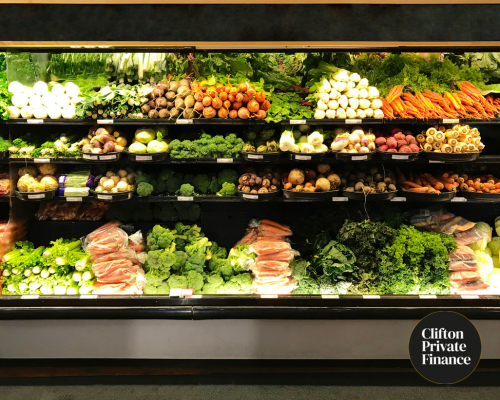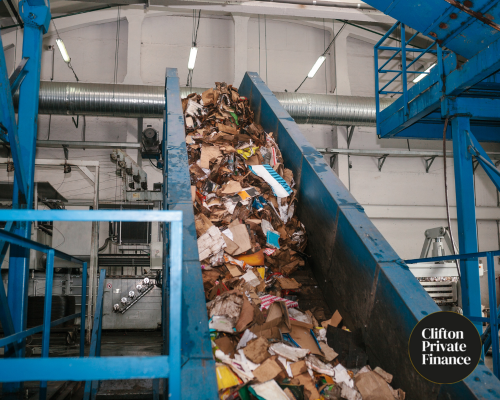Categories
Commercial Mortgage Rates

Commercial mortgages are a vital source of finance for British businesses looking to purchase or expand into new premises. But finding a suitable product and navigating commercial mortgage rates can be tricky - here's how we can help.
Written by: Sam Hodgson
There are some key differences between commercial mortgage rates and residential products that you'll need to know when exploring finance options.
Commercial Mortgage Calculator Last updated: 16th September 2025
LTV: --%
For example, commercial mortgage rates are generally higher (typically between 7-12%) so it pays to compare rates and use a broker to get the best deal.
This in-depth guide covers everything you need to know about securing competitive commercial mortgage rates and terms. Read on for details on:
- How commercial mortgage rates and deals are set by lenders
- The range of interest rate options and structures
- Factors that influence the rate and loan secured
- Commercial mortgage affordability calculations
- Steps to getting the best commercial interest rate
- Different repayment routes and terms
- Extra fees to account for
- The process of applying for a commercial mortgage
Written by: Sam Hodgson
Contents
How Much Are Commercial Mortgage Rates?
Key Commercial Mortgage Fees and Charges
How Commercial Mortgages Can Fund Growth
How Much Are Commercial Mortgage Rates?
Commercial mortgage rates are typically between 7-12%.
The exact rate you get will depend on:
- Your company's credit score
- How quickly you need finance arranged
- The lender you use
- The nature of the business and sector
- Your business accounts and financial history
- The company directors' credit scores
- The sum required and loan-to-value (LTV) ratio
- The property type, condition and location
Lenders use this information to build a risk profile and apply an interest rate margin above their own internal prime lending rates.
Commercial rates can vary significantly between lenders, so it's good to speak to a commercial mortgage adviser such as Clifton Private Finance.
Those with lower risk profiles get lower margins, while higher-risk businesses face larger margins. However, wider economic factors also influence the base rate lenders use, meaning commercial rates rise amidst inflation and base rate hikes.
Commercial Mortgage Calculator Last updated: 16th September 2025
LTV: --%
Case study: Read our case study on how we helped a London portfolio landlord remortgage 18 properties on the same day
Commercial Mortgage Interest Rate Types
There are two main interest rate options for British firms choosing commercial mortgages:
- Fixed rates - The interest rate remains the same for a set period, such as 2, 3 or 5 years. This gives certainty over regular repayments.
- Variable rates - The interest rate fluctuates with the lender's standard variable rate. This means repayments can increase or decrease over the mortgage term.
Fixed rates usually come with arrangement fees but offer peace of mind. In contrast, variable rates pose a risk of rising interest costs but provide flexibility and the potential to save money if rates do go down.
The option that works best depends on individual business circumstances and outlook.
What Affects Commercial Mortgage Rates?
There are a number of key factors mortgage lenders evaluate to determine rate offers. These include:
- Credit score - Businesses with scores over 750 typically get better rates. However, lenders will still consider bad credit commercial mortgages - certain specialised lenders offer commercial mortgages to individuals with poor credit history, but they typically operate outside of mainstream financial institutions and often rely on intermediaries like professional brokers.
- Loan-to-value (LTV) ratio - Lower LTVs below 75% get more competitive rates. The ideal is 60% or less.
- Loan term length - Longer terms of 25+ years have higher rates. Shorter terms get lower offers.
- Property value and type - More valuable properties and less risky sectors like industrial tend to have lower rates. Retail is considered higher risk.
- Location - Properties in highly desirable areas like London often achieve better rates. Rural areas sometimes get higher rates on the other hand.
Optimising as many factors as possible enables you to access the lowest and most competitive interest rates. Bringing significant equity contributions to your project helps secure prime LTV ratios for reduced rates as well.
Commercial Mortgage Calculator
For a better initial understanding of what you'll pay for a commercial mortgage, use our commercial mortgage calculator.
Recent Commercial Mortgage Case Studies
How to Get the Best Commercial Mortgage Rate?
Here are some tips for businesses to get the lowest rate deal within their budget:
- Have a deposit ready covering 25-30%+ of the property's value to reach lower LTV thresholds
- Check company directors' personal credit files and aim for 750+ credit scores
- Research the whole market and get quotes from multiple lenders, both high street and specialist. It is important to compare before the outset – a specialist commercial mortgage broker, such as us at Clifton Private Finance, can help you steer in the right direction
- Prepare detailed financial forecasts with a solid business plan justifying the property purchase
- Look at both fixed and variable options to find the best initial deal for your situation
- Check for lenders offering incentives like free valuations or legal work
Taking the time to prepare thoroughly provides the best chance of securing a competitive rate, and you should consider both larger high-street banks and specialist commercial lenders when comparing mortgage deals.
Commercial Mortgage Affordability Calculations
Lenders assess affordability based on the rental income potential from the property alongside the core business' earnings.
Remember that the monthly repayment amount on a commercial mortgage should not exceed 40-50% of the company's total income sources. Interest cover ratios are also calculated to assess whether the income sufficiently covers interest payments by 150% to 200% or more - this is also referred to as stress testing.
If you're looking at a potential commercial property, getting an Agreement in Principle early on can indicate your potential borrowing amounts to give you an idea of affordability.
Speak to us today, and we can arrange a commercial mortgage AIP tailored to your goals.
Commercial Mortgage Repayment Terms and Options
There are two main routes for repaying commercial mortgages:
- Repayment (capital and interest) mortgages – these mortgages have set monthly payments that cover both the interest and paying off part of the capital borrowed, ensuring the debt reduces over time.
- Interest-only commercial mortgages – these entail lower monthly payments covering just the interest charges. A separate plan is needed to pay off the total capital sum at the end of the mortgage term - for example, selling the property or other business assets to repay the mortgage.
Interest-only deals must be carefully assessed in terms of affordability and viable capital repayment plans. Letting rental income cover interest costs can also help cash flow.
To get an idea of what it could cost you, you can take a look at our interest-only mortgage calculator
Some lenders also offer commercial loans with added flexibility:
- Offsets - Rental income from the property can offset monthly repayments, and any surplus income remains accessible in the business account.
- Roll-up mortgages - Interest costs can be rolled up and repaid as a lump sum later, which is helpful for properties undergoing construction because it protects your cash flow.
Mortgage terms vary too, often between 10-25 years. Shorter terms of 10-15 years have lower rates but higher monthly payments, and visa versa.
Key Commercial Mortgage Fees and Charges
Alongside interest rates, it is important to factor in the various fees and charges that come along with a commercial mortgage. Here are some of the important ones to consider when budgeting:
Arrangement Fees
Typically 0.5% to 2% of the loan amount. It's best to check if it's deducted upfront or added to your loan.
Valuation Fees
Costs £200-£1,000+ depending on property value and type but can vary
Legal Fees
£500-£2,000+ for completing conveyancing. Check for free legal offers from some lenders and products and factor this into comparing costs.
Early Repayment Charges
Exit fees if repaying the loan before the mortgage term ends - crucial to check if you intend to possibly do this.
Higher Lending Fee
Added for LTV ratios over 70-75% and is often 0.5% of loan size.
Annual Review/Monitoring Fees
Some lenders charge £100-£500 a year for this.
Remember to compare true total costs from lenders, not just the headline interest rates, because small differences in fees can add up over time.
The Commercial Mortgage Application Process
You can follow these key steps when applying for commercial property finance:
- Calculate your total finance needed - Purchase price, taxes, refurbishment, and fees.
- Speak to a broker if you need help with your application and to compare the whole market.
- Decide on your lender and submit your full application with your documents.
- Your lender undertakes a valuation, credit checks and an affordability assessment.
- Final mortgage offer received. You'll need to provide more documents to confirm your situation hasn't changed.
- Legal work is finalised, surveys are done, and the completion date is set.
- Your mortgage starts on completion, and your initial payments are due one month later.
Specialist finance brokers at Clifton Private Finance can support you with exploring options, preparing paperwork, managing applications, and generally making the whole process smooth and fast.
When Done Right, Commercial Mortgages Can Fund Growth
Taking the time to secure the right commercial mortgage deal provides an excellent means for businesses to fund their expansion into new premises. Matching finance needs to income and property prospects is key.
With the best commercial mortgage rate in place, companies can look forward to capitalising on opportunities, driving growth, and moving their business forward.
Need Advice with Commercial Mortgage Rates?
Taking out commercial property finance can be complex. At Clifton Private Finance, our specialist brokers can guide you through the process and help secure the best mortgage rate for your needs. With access to a network of lenders, we can take clients directly to the source – and get them in front of the right lender for their needs.
Working with an adviser can get you access to market-leading rates, bespoke finance, and can ensure that your application is presented to the lender in the best possible light.
To see what we can do for you, call us at 0203 880 8890 or book a free consultation.
FAQs
What is a Typical Commercial Mortgage Rate?
Average rates are usually between 7-12% but it depends on many factors. Sole traders may pay 9% or more while big PLCs could secure sub-7% rates.
Are Commercial Mortgage Rates Higher Than Residential Mortgages?
Yes, commercial rates are often a little higher due to the increased risks involved for lenders. But the right lender/deal could potentially beat residential mortgage rates.
What's the Lowest Commercial Mortgage Rate Available?
In rare cases with ideal clients, some lenders may offer rates as low as 6%. But for most, the lowest will be around 7% in the current climate.
Can I Switch Commercial Mortgage Lenders?
Yes, you can remortgage to a new lender when your initial deal ends. There may be exit fees to factor in but new deals are possible.
How Often Do Commercial Mortgage Rates Change?
Variable rates can change monthly. Fixed rates are set for 1-5 years typically. But new fixed deals appear frequently in line with market rates.













